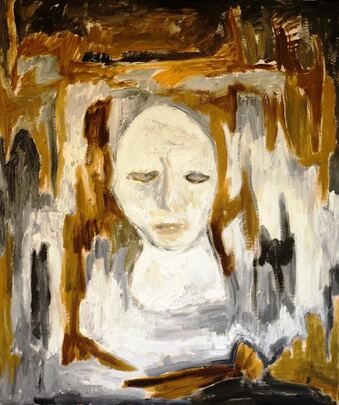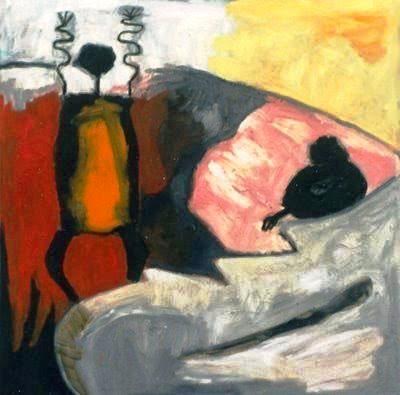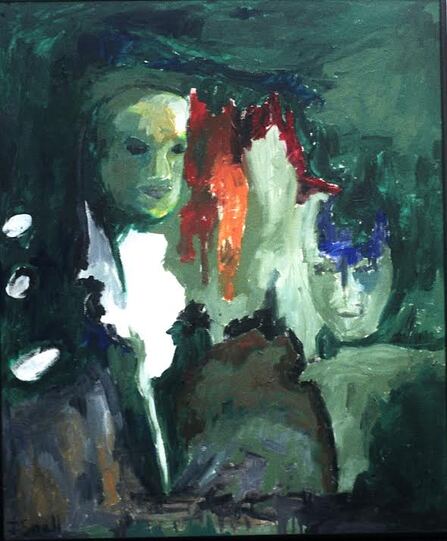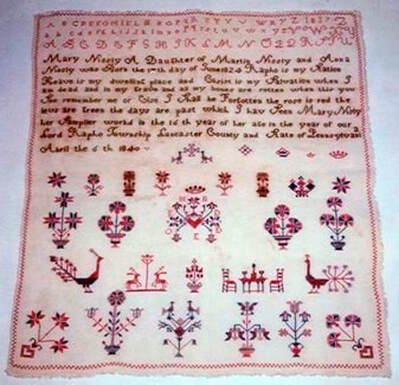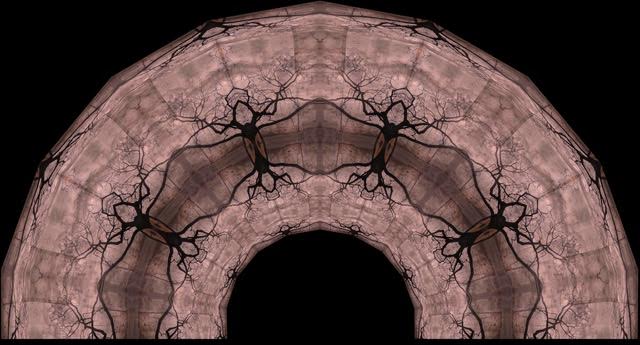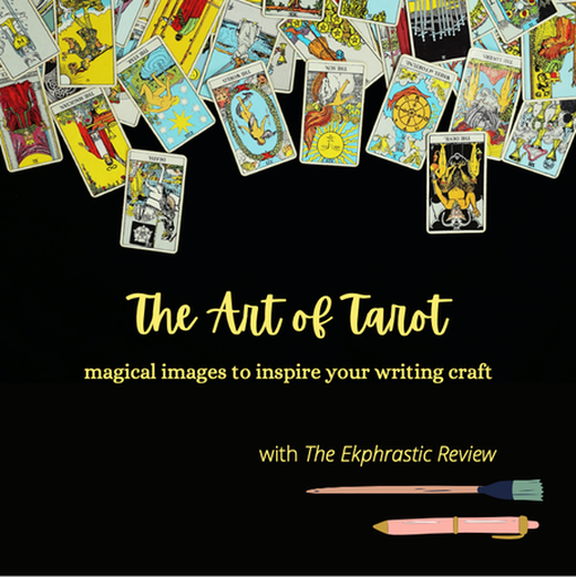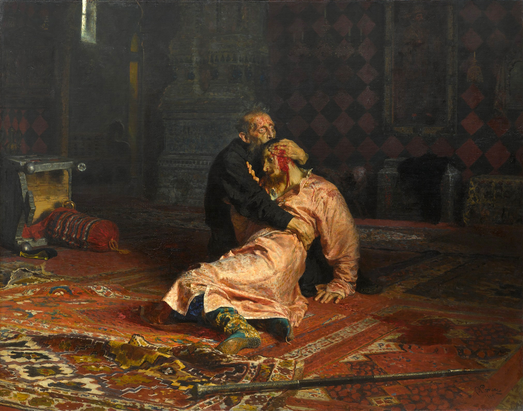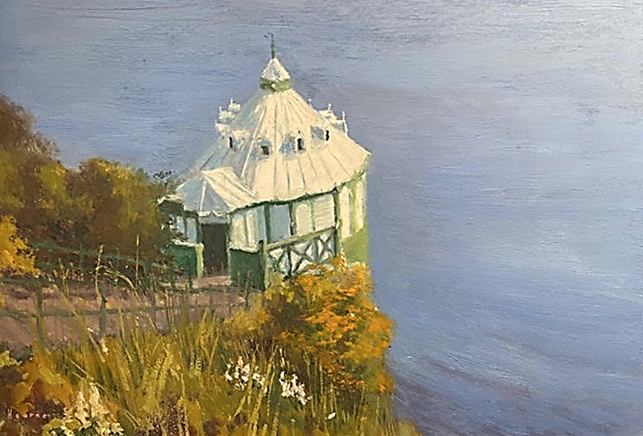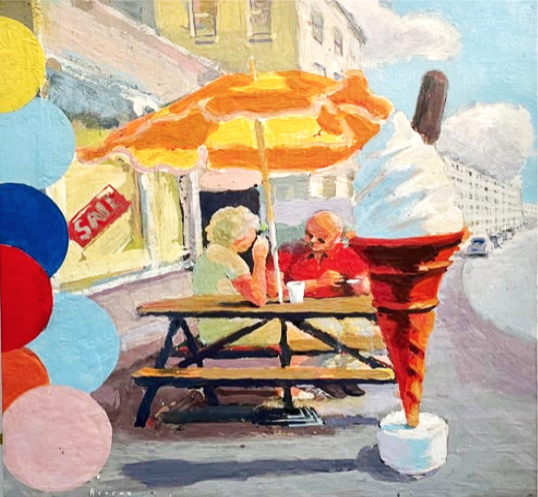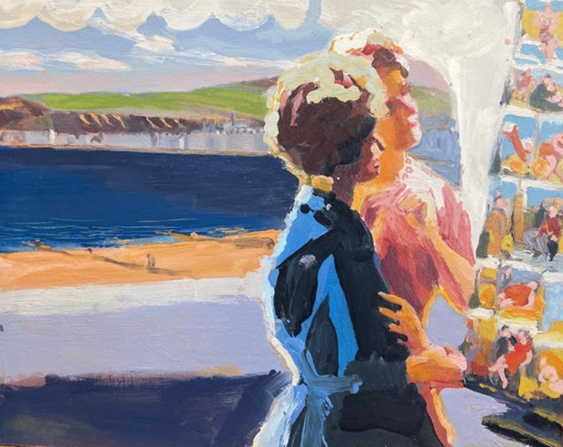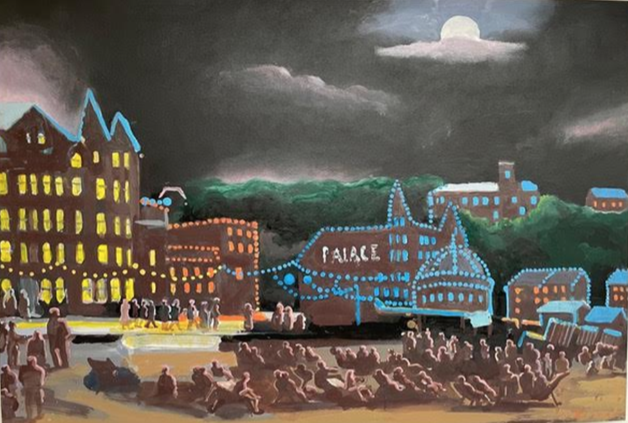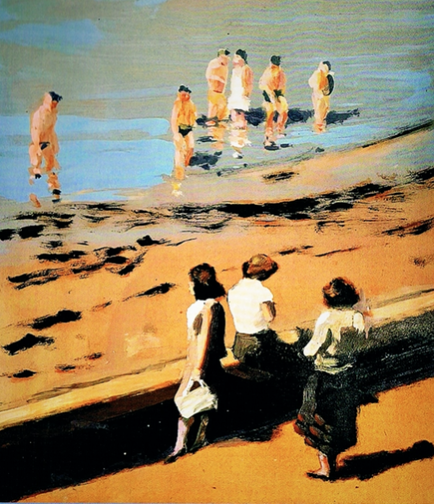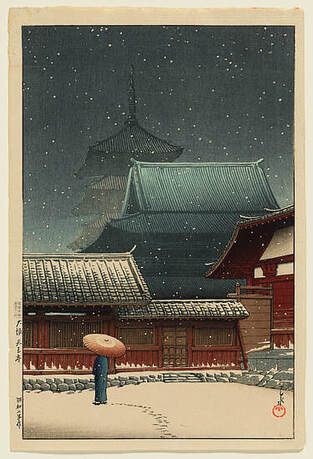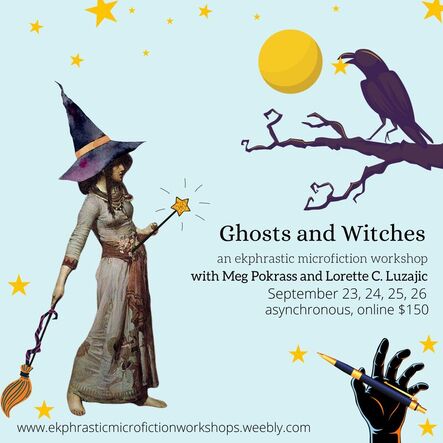|
The Light Fantastic Nevertheless, we made our home in a room lit by two candles. One flame glowed while the other flickered. Your light stared like an interrogation; it never let me sleep. Mine blinked and winked until the room closed its lids. Afterward, we watched the moon in the window thicken like skin. Why should we have feared the dark? We’d taken the bright inside us. Something up with which I will not put Outside seeped inside where my before had shut the door on your after. Now inside among, you turn the light down, and then out. Either I am dreaming or your words have learned to zig and zag around and about. Aside from that, they come aboard with the meanings all athwart. They lie about why your without is suddenly within again. Before they arise only to raze, I remember that across is but along, against is beside, and between so near it convinces me that I never wanted you behind, with me this far beyond. Ring with Tossed Hat Think of a river dotted with lanterns, and I’ll watch from under this hat until I can no longer make out the yellow pinpricks that were so easy to discern before the dark descended, before I dropped to my knees, before I folded myself into myself, the sky above diagrammed with an exit of clouds flung in a confusion of three-cornered objects that would, could, and should blanket a sky under which the day had spoiled in the sun. Cheryl Snell Cheryl Snell is a poet and writer with collections from Finishing Line, Pudding House, and other publishers. She is also the author of Bombay Trilogy, and she collaborated with her late sister Janet on many ekphrastic projects.
1 Comment
Missing Elegy For Mary Remember me-- embroidered above a heart sewn crooked on creased linen. With crude silk you stitched a table set untouched—glasses full and chairs pulled out but empty as the house you once lived in. I wonder if your mother shook her head at your off-centre heart. I wonder if your fingers wavered when the needle needed re-threading. Mary, why can’t you sew straight— she’d scold, clenching all the linen you wasted. You’d steady your hands, shut your mouth tight, and try once more. Remember me. I wonder if you cried out to Christ because you knew you’d be forgotten like that undrunk wine or the house you once lived in—a girl with futile hands, trembling fingers useless to wrinkled linen and a needle crooked as those lines of verse where you dreamt of a grave’s salvation. Grace Celi Grace Celi (she/her) is currently pursuing a B.A. in Creative Writing at Franklin & Marshall College. She is originally from Brooklyn, New York. Her recent work is forthcoming in Beyond Queer Words and Prairie Margins. Black Lightning Insects crawl along the road to Kyif, tanks on their backs as the world watches on TV what seems a fantasy, a wargame that can’t be stopped. It started with static in the air, clouds amassed on the border. Invasion so often predicted that when it did, it took a while for us to look up from the television’s glare — an aura of black lightening kaleidoscoped everywhere. From the east, south and north the war machine thunders in while citizens in black fatigue, block the roads, lock arms in solidarity. It’s another far away war -- on and off with the remote, scroll the mouse and click: we post sunflowers and click: profile a blue and yellow flag. A stone lodged in our stomachs, as each day breaks and slides away We are 6000 miles from there, seven hours behind and sleeping. as they wake to sirens. Our eyes closed, hallucinating black lightening, the charred skeleton of trees behind ensanguined lids. Diana Cole Diana Cole, a Pushcart Prize nominee, has had poems published in numerous journals including Poetry East, Spillway, The Tar River Review, Cider Press Review, The Public’s Radio 89.3, Friends Journal, Verse Daily, Tipton Poetry Journal, The New Verse News and most recently in The Main Street Rag and Crab Creek Review. Her chapbook, Songs by Heart was published in 2018 by Iris Press. She is an editor for The Crosswinds Poetry Journal and a member of Ocean State Poets whose mission is to encourage the reading, writing and sharing of poetry. We are very pleased to announce our new ekphrastic contest, on the theme of Tarot art. And we are absolutely thrilled to have guest judges Riham Adly and Roula-Maria Dib on board! Riham, our flash fiction judge, reads, writes, and teaches from the framework of the unconscious and has a special interest in Tarot imagery. Roula-Maria, editor of Indelible Journal, is a renowned Jungian scholar and poet. Find out more about these writers, their work, and what they'll be looking for below. The Tarot's evolution from parlour games to gambling houses to divination claims is as fascinating as the timeless and mysterious archetypal images on the cards. The Tarot is widely used today for cartomancy, but it started out as a popular game and took a mystical turn in the 18th century. A modern approach is to use the archetypal symbols that fascinated Carl Jung for therapeutic purposes, psychological reflection, and creative exercises. We can't wait to see what these images inspire you to write! ** The Art of Tarot Rules 1. $10 CAD (approx. $7 USD) entry fee gets you an ebook with 36 Tarot-themed images, and you can submit three flashes or poems. First place prize for poetry and for flash fiction land $100 CAD prize each. 2. You can enter as many times as you like, using The Art of Tarot purchase button below as many times as you wish. 3. Poetry and flash fiction, up to 750 words per piece. 4. Use one or more of the artworks in the booklet to inspire your stories and poetry. You can interpret the artwork and the theme in any way you are moved to. Read the judges' overviews in this post (below) to get a feel for what they're looking for. 5. Ten poems and ten flashes will be chosen by the editor of TER and by our guest judges to publish in The Ekphrastic Review. Three poems and three stories will be finalists. One poem and one flash will take first place and each win $100CAD. The judges will read submissions blind. 6. Include a 75 words or less bio. 7. Use TAROT in the subject line. 8. Deadline is November 23, 2022. 9. Winners will be announced in December. 10. Submission email: theekphrasticreview@gmail.com A Word From Our Guest Judges Sometimes, the only way for us to confront a truth is to summon that never-ending fast track we call life, viewing it in a whirr, before slowing down to examine its components under the microscope. Having discovered that Tarot cards are nothing but archetypical images representing one’s journey—or what mythologist Joseph Campbell describes as “the hero’s journey,” we can use these symbols to create stories that thrust us further into the essence of our characters' journey, their perspectives and core emotions. The journey could be something as subtle as small adjustments that characters realize they need to go through, or revelations that are deep and internal. I would love if you could explore the storylines and the archetypical images in those cards using details, colours, and associations to see into the depth of your own Self. From there, explore new themes in your own writing, perhaps revisiting recurring themes, and understanding where it’s all coming from, as you craft your flash fiction. Riham Adly It is a with great honour and pleasure that I partake in this exceptional event, The Art of Tarot, so carefully put together by the inspiring artist, poet, and writer, Lorette C. Luzajic. While I don’t understand much about the Tarot in terms of technique, what I know is that it is a powerful array of symbols and images that move our archetypal energies into action. And the difference between “knowing” and “understanding”, by the way, is also something Tarot cards teach us. They speak to us in the language of poetry, which we grasp without any conventional tools of rational comprehension. Because symbols point toward possible meanings, the images of the Tarot speak possibilities without fixed meanings, pointing to the non-rational aspects of who we are. Unlike literalism and just like poetry, the Tarot brings back this symbolic essence of connection to other forms of reality. These cards are their own unique “alphabet” sparking truths through negative capability and synchronicities—a fascinating “alphabet” that the psyche can only fathom archetypally. We would see that each card has its own character, flavour, or personality, which matches one of our many archetypal voices that were activated while looking at it. And it is with great excitement to read your poems inspired by such rich visual language, the language of symbols, open—as ever—to hosting the unconscious. The ekphrastic journeys of your poems are evidence of your transition from the “visual” to the “visionary,” where the different voices of the images come to you to be embodied in such beautiful verse! Roula-Maria Dib Riham Adly is an award-winning flash fiction writer from Giza, Egypt. In 2013 her story “The Darker Side of the Moon” won the MAKAN award. In 2022 she won second prize in the Strands International Flash Fiction Competition. She is a Best of the Net and a Pushcart Prize nominee. Her work is included in the Best Micro-fiction 2020 anthology. Her fiction has appeared in over 50 online journals such as Litro Magazine, Lost Balloon, The Flash Flood, Bending Genres, The Citron Review, The Sunlight Press, Flash Fiction Magazine, Menacing Hedge, Flash Frontier, Flash Back, Ellipsis Zine, Okay Donkey, and New Flash Fiction Review among others. Riham has worked as an assistant editor in 101 Words and as a first reader in Vestal Review. Riham is the founder of the “Let’s Write Short Stories” and “Let’s Write That Novel” in Egypt. She has taught creative writing all over Cairo for years with the goal of mentoring and empowering aspiring writers in her region. Riham’s flash fiction collection Love is Make-Believe was released and published in November 2021 by Clarendon House in the UK. She is the first African, Arab woman to have a flash fiction collection published in English. Riham shares her craft articles about writing flash fiction through her blog “Riham Writes” and reviews a new flash fiction collection every month on her FB group “Riham Reads Flash.” Roula-Maria Dib is an award-winning literary scholar, poet, and editor whose research interests include literature, modern poetry and poetics, creative writing, and Jungian psychology. She is endorsed by the British Academy and holds a UK Global Talent Visa. Roula is the winner of the British Council’s Alumni Awards 2021-2022 for the Culture and Creativity category in the UAE and had also won the American University in Dubai’s Provost’s Award for Outstanding Literary Achievement 2020; her book, Jungian Metaphor in Modernist Literature (Routledge, 2020) was shortlisted as a finalist for the international IAJS book awards, and some poems from her collection, Simply Being (Chiron Press, 2021) received Pushcart Prize nominations. She is the founding editor of literary and arts journal, Indelible, and creative producer of literary event series, Indelible Evenings, as well as Psychreative, a virtual salon for researchers, artists, and writers with a background in Jungian psychology. Her MOOC, “Why Online Creative Communities Matter” is featured on Academia.edu. Formerly (until June 2022), she was a professor of English at the American University in Dubai. A Son's Deathbed also after Damage, directed by Louis Malle (1992) Holding the flesh that was his boy, Ivan's own pumps about the cradle. Blood peaks in his eyes, the river deathbed not coming soon enough. A filmmaker wanted a man more broken than he’d ever filmed, his son too innocent to know his Old Man. Once he does, the boy springs back too far, over a banister, to his death. For this, director Louis Malle went to Repin’s father, trapped in a prison-parlor. His endless creation. Matthew Sorrento Matthew Sorrento is Editor-in-chief of Retreats from Oblivion: The Journal of NoirCon and Co-editor of Film International. A critic and poet with publications in RFO and The Five-Two, he teaches film and media studies at Rutgers University in Camden, NJ. His latest book is David Fincher’s Zodiac: Cinema of Investigation and (Mis)Interpretation (co-edited with David Ryan, FDU Press, December 2021). Being Human after Tehuantepec, Oaxa, photography by Graciela Iturbide (Mexico) 1985 (Click here to view.) We are the fish of the world. We eat and are eaten. Cranes pick our teeth and leave the strings of our naked jaws to gnaw the grass until they become the earth. We pick raspberries from uncut canes and share bare roots for planting. We eat the sweet flesh and piths of those empty-bellied bodies. We are full-bellied roses frost-burnt, drooping and tight blooms coiled pink and white, pulsing into winter. We are rusty wombs swimming, umbilicus singing, We are sedum, tight-packed pink in summer, Nautilus, coriolis-spiral under first snow, thawing under last, lifting through the melt. We are the crane again plucking fish like flushed berries, the sky--blue, black, blushing-- the trees lifting in mist, roads crawling away, dollhouses full of furniture but empty of children, ozone after rain, company waiting, a fiddler's broken string, and all the earth is a singing companion. Julene Waffle Julene Waffle, a graduate of Hartwick College and Binghamton University, is a teacher in a rural NYS public school, an entrepreneur, a nature lover, a wife, a mother of three boys, two dogs, three cats, and, of course, she is a writer. She finds great pleasure in juggling all these things and managing to seem like she has it all together.. Her work has appeared in The Adroit Journal, NCTE’s English Journal, La Presa, The Non-Conformist, The Ekphrastic Review, and Mslexia, among others. She was also published in the anthologies Civilization in Crisis, American Writers Review 2021, and Seeing Things (2020), and her chapbook So I Will Remember was published in 2020. Learn more at www.wafflepoetry.com. Camera Obscura Poised on the headland, a wooden tented circular corridor its mirrored cubicles bringing the outside in with scenes from around the corner; the yellowed green and brown of cliff tops, a busy funnelled harbour, seagulls that clamour and sweep above weathered benches where walkers rest to peer lazily out to sea. Obscured, Edwardian tourists would eagerly spy on bathers cavorting in the sea pools below, or else searched for couples cuddling on summer warmed slopes. Inside, I think of Foucault’s and Bentham’s surveying panopticons and as I move from cubical to cubical and from glass imaged screen to screen, the foot stained wooden floor trembles and persistently creaks. There is a sense of an unwelcome presence, following in the magical and flickering dark. The Morning After A chance meeting, a night together sleeping in holiday cuddles of middle-aged love. With an early breakfast cuppa, she reveals her doubts as he listens as best he can. In the cold light of day, they wonder why they were so eager and at what price they might have to pay. Will it last, was it worth it, should they do it again? The answer is there plain to see, soft fleshy balloons, erect ice cream. It was all just a Freudian dream. Postcard to Home Two young Irish maids, one of many required during summer seasons. Temporary come-overs working in hotels, boarding houses and holiday camps. Some were lucky, considered one of the family, others exploited; laying tables, serving meals, washing up, fetching groceries, looking after children, folding sheets beating carpets, scrubbing floors walking the dogs and emptying piss pots for a pittance. Time off and a postcard home to friends and family provides some solace, searching for one to send. But garish jokes are edgy with misplaced fun not kind to some. Wish you were here. No not for them, Wish we were there. Back home. A Changing Moment Fairy lights and hotel windows cascade along the promenades, their evening summer glow edging the sea-side sand. Couples dance on palace polished floors as orchestras replay their youth. Others gather on crowded deck chairs, sharing their shading shadows to watch a full moon rising. Dark clouds gather, the moment already fading. Holiday Meeting Showing off, the tight trunked boys, come in from the sea and face the girls, who have deftly escaped by leaving their parents in smoky pubs and cake sweet cafés. The trio of girls shyly eye the bathers, until with more lascivious looks the young Romeos will sit with them in promenade shelters, breathing in their heady perfumes to steal an eager kiss. Hiding their teenage fears and the holiday tears to come. Doug Sandle Doug Sandle is a writer, a psychologist and a former university academic. He has been published intermittently over the years, including once sharing a poetry page with Harold Pinter. More recently his poetry has appeared in The New European, The Ekphrastic Review, Poetry and Covid and the anthology The View from Olympia (poems on Olympic sports). He has also written short stories and plays, including a BBC and Radio New Zealand broadcast. He was born and brought up on the Isle of Man. Endeavour to Breach the Anxiety “To love is to be afraid. You are frightened, deathly terrified, that something will happen to those you love... And love enslaves us all, for you cannot have love without fear.” Marie Lu Lordotic rooftops - what fear holds you from the door, spire in the snow sky. John L. Stanizzi John L. Stanizzi is author many collections including Ecstasy Among Ghosts and The Tree That Lights The Way Home. His work has been widely published, including in Prairie Schooner, The New York Quarterly, Rattle, and more. His work has been translated into Italian. John is the Flash Fiction Editor of Abstract Magazine TV. A former Wesleyan University Etherington Scholar, and New England Poet of the Year (1998), John has just been awarded an Artist Fellowship in Creative Non-Fiction – 2021 - from the Connecticut Office of the Arts and Culture for work on his new memoir. He teaches literature at Manchester Community College in Manchester, Connecticut, and lives with his wife, Carol, in Coventry, CT. https://www.johnlstanizzi.com The Curious are Staring at my Pussy, who is Staring at the Curious after Leonor Fini My pussy is nobody’s fool. This one sits in my lap while I pose for the camera, knowing that nothing is forever. Once, she was a naive little kitten and later, a merry old cat. Today, she is a middle-aged vixen who likes to be photographed. Today, she loves me more than she loves my lovers. To appease her, each of my lovers must present her with a story about their favourite cat. “Don’t bother with flowers,” she says, “just tell us your best cat story.” While they drone on and on, we prune them for fleas. While they babble, we torture with bites. My pussy offers them one tiny, bleeding mouse as a final door-prize, and they nurse it back to health. Meg Pokrass Meg Pokrass is the author of 8 flash fiction and prose poetry collections. Her work has been published in hundreds of literary journals and in three recent Norton anthologies of the flash form. She is the Founding Editor of Best Microfiction. Next weekend is a very special workshop on witchy microfiction with the incredible Meg Pokrass and Lorette!
ekphrasticmicrofictionworkshops.weebly.comClick here or on image above for more information or to nab the last few spots. We'll be working on some spooky stories, taking inspiration from some fascinating paintings of ghosts and witches. In these workshops, you work at your own pace and connect with others online in a private Facebook group. You will write from your own timezone and schedule. “Where to begin? Lorette and Meg are the perfect team. They both are experienced teachers and create a safe environment. The feedback is positive and constructive. I find that whenever I take these workshops (and I hope to do that as often as they are offered), I feel braver and more willing to take risks. I always feel supported in trying new ideas, and styles. When I first started, I was writing only poetry and was hesitant to try microfiction. Now I feel equally comfortable in both. There is always enough choice in the prompts that I feel comfortable-there is something for every taste. And I have been pleasantly surprised to find that some of the choices I made that I thought would be the hardest gave me some of the most creative pieces. The asynchronous aspect of the workshops makes it possible for people from all over can participate. And that is an added benefit--there are different cultures sharing art in the same space. I've met many people in the workshops and continue to communicate with them. I am always thrilled when I read a writer’s piece that grew out of one of our workshops.” Lynne Kemen |
The Ekphrastic Review
COOKIES/PRIVACY
This site uses cookies to deliver your best navigation experience this time and next. Continuing here means you consent to cookies. Thank you. Join us on Facebook:
Tickled Pink Contest
April 2024
|
